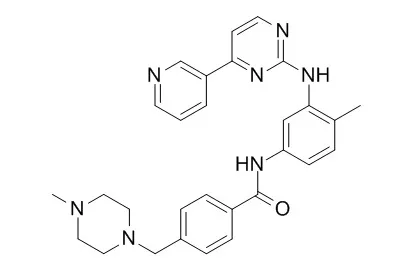| In vitro: |
| Blood,2000 Aug 1;96(3):925-32. | | Inhibition of c-kit receptor tyrosine kinase activity by STI 571, a selective tyrosine kinase inhibitor.[Pubmed: 10910906] | STI 571 (formerly known as CGP 57148B) is a known inhibitor of the c-abl, bcr-abl, and platelet-derived growth-factor receptor (PDGFR) tyrosine kinases. This compound is being evaluated in clinical trials for the treatment of chronic myelogenous leukemia.
METHODS AND RESULTS:
We sought to extend the activity profile of STI 571 by testing its ability to inhibit the tyrosine kinase activity of c-kit, a receptor structurally similar to PDGFR. We treated a c-kit expressing a human myeloid leukemia cell line, M-07e, with STI 571 before stimulation with Steel factor (SLF). STI 571 inhibited c-kit autophosphorylation, activation of mitogen-activated protein (MAP) kinase, and activation of Akt without altering total protein levels of c-kit, MAP kinase, or Akt. The concentration that produced 50% inhibition for these effects was approximately 100 nmol/L. STI 571 also significantly decreased SLF-dependent growth of M-07e cells in a dose-dependent manner and blocked the antiapoptotic activity of SLF. In contrast, the compound had no effect on MAP kinase activation or cellular proliferation in response to granulocyte-macrophage colony-stimulating factor. We also tested the activity of STI 571 in a human mast cell leukemia cell line (HMC-1), which has an activated mutant form of c-kit. STI 571 had a more potent inhibitory effect on the kinase activity of this mutant receptor than it did on ligand-dependent activation of the wild-type receptor.
CONCLUSIONS:
These findings show that STI 571 selectively inhibits c-kit tyrosine kinase activity and downstream activation of target proteins involved in cellular proliferation and survival. This compound may be useful in treating cancers associated with increased c-kit kinase activity. | | Int J Cancer,2005 Feb 20;113(5):849-56. | | In vivo efficacy of STI571 in xenografted human small cell lung cancer alone or combined with chemotherapy.[Pubmed: 15499612] | STI571, or imatinib, selectively inhibits BCR/ABL, PDGFR and c-kit kinase activity. It has been reported that a large proportion of small cell lung cancer (SCLC) cell lines and tumors express c-kit and that STI571 inhibits tumor cell growth.
METHODS AND RESULTS:
We therefore investigated the therapeutic efficacy of STI571, alone or combined with chemotherapy, in human SCLC cells or tumors xenografted into nude mice. The level of c-kit mRNA expression was variable in SCLC tumors (positive for 2 of 4 xenografts), and c-kit protein was not detected by immunohistochemistry. On the 4 xenografted tumors, PDGFRalpha and PDGFRbeta were not detected by immunohistochemistry. STI571 induced inhibition of proliferation of the SCLC6 cell line without inducing apoptosis; in contrast, in combination with etoposide or topotecan, the growth inhibition of SCLC6 cells induced by STI571 was increased, with apoptotic DNA fragmentation. Four human SCLC xenografts (SCLC6, SCLC61, SCLC74 and SCLC108) were transplanted into mice. After intraperitoneal injection of STI571, we observed 80%, 40% and 78% growth inhibition of SCLC6, SCLC61 and SCLC108 tumors, respectively, without any significant inhibition of SCLC74 tumor growth. In mice bearing responsive SCLC tumors, we observed an increase of growth inhibition induced by chemotherapy (etoposide + ifosfamide or topotecan) by concomitant and continuous administration of STI571, associated with an increase of toxic deaths. In SCLC6-bearing mice receiving sequential treatments, we observed a reduction of toxic deaths but a decrease of synergistic antitumor efficacy.
CONCLUSIONS:
In conclusion, the efficacy of STI571 alone in SCLC xenografted tumors was variable and did not depend on c-kit expression. Moreover, a significant increase of chemotherapy-induced growth inhibition was obtained by concomitant administration of STI571 that should be carefully investigated in SCLC patients. |
|






 Cell. 2018 Jan 11;172(1-2):249-261.e12. doi: 10.1016/j.cell.2017.12.019.IF=36.216(2019)
Cell. 2018 Jan 11;172(1-2):249-261.e12. doi: 10.1016/j.cell.2017.12.019.IF=36.216(2019) Cell Metab. 2020 Mar 3;31(3):534-548.e5. doi: 10.1016/j.cmet.2020.01.002.IF=22.415(2019)
Cell Metab. 2020 Mar 3;31(3):534-548.e5. doi: 10.1016/j.cmet.2020.01.002.IF=22.415(2019) Mol Cell. 2017 Nov 16;68(4):673-685.e6. doi: 10.1016/j.molcel.2017.10.022.IF=14.548(2019)
Mol Cell. 2017 Nov 16;68(4):673-685.e6. doi: 10.1016/j.molcel.2017.10.022.IF=14.548(2019)